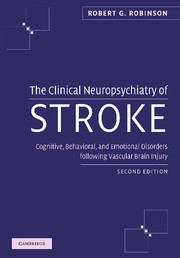 The Clinical Neuropsychiatry of Stroke
The Clinical Neuropsychiatry of Stroke Book contents
- Frontmatter
- Contents
- Preface
- Part I Introduction
- Part II Poststroke depression
- Part III Poststroke mania
- Part IV Poststroke anxiety disorders
- Part V Other poststroke disorders
- 34 Psychosis
- 35 Anosognosia and denial of illness
- 36 Catastrophic reaction
- 37 Apathy
- 38 Disturbance of prosody
- 39 Irritability and aggression
- 40 Pathological laughing and crying
- 41 Summary and future directions
- Index
38 - Disturbance of prosody
from Part V - Other poststroke disorders
Published online by Cambridge University Press: 01 October 2009
- Frontmatter
- Contents
- Preface
- Part I Introduction
- Part II Poststroke depression
- Part III Poststroke mania
- Part IV Poststroke anxiety disorders
- Part V Other poststroke disorders
- 34 Psychosis
- 35 Anosognosia and denial of illness
- 36 Catastrophic reaction
- 37 Apathy
- 38 Disturbance of prosody
- 39 Irritability and aggression
- 40 Pathological laughing and crying
- 41 Summary and future directions
- Index
Summary
Monrad-Krohn (1947) described prosody as the melodic line of speech produced by variations of pitch, rhythm, and stress of pronunciation. Heilman and Valenstein (1993) divided prosody into two types: affective aprosody, described as the loss or defect in expression, repetition, or comprehension of emotionally intoned speech and prepositional aprosody, characterized by a loss of or defect in expression, repetition, or comprehension of sentences with prepositional content such as questions, statements, or commands. Heilman et al. (1975) reported that patients with right temporoparietal lesions had more deficits in their comprehension of affective prosody than patients with left temporoparietal lesions. Cancelliere and Kertesz (1990) reported an increased frequency of impairment in affective prosody involving comprehension of emotion in speech associated with basal ganglia lesions but failed to find a significantly higher frequency among patients with right hemisphere as compared with left hemisphere lesions. Patients with comprehension aprosody or expressive aprosody may appear to have an emotional disorder because of their inability to either express emotion in the tone, pitch or rhythm of their voice, or comprehend emotional intonation in the voices of others. They appear to be flat or blunted in their facial expression.
Prosody may also be extended in its concept to include the expression or comprehension of not only verbal language but also facial and gestural affective appearance (Ross 1981).
- Type
- Chapter
- Information
- The Clinical Neuropsychiatry of StrokeCognitive, Behavioral and Emotional Disorders following Vascular Brain Injury, pp. 403 - 413Publisher: Cambridge University PressPrint publication year: 2006


